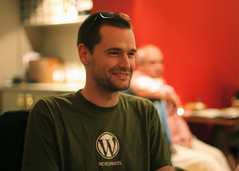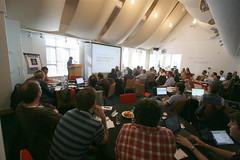Get posts sent to your inbox:
My last day
In my current job will be 12 September 2008. So I’ll be available for new stuff from the 15th.
Just so you all know 😉

An online notebook
Get posts sent to your inbox:

An online notebook
In my current job will be 12 September 2008. So I’ll be available for new stuff from the 15th.
Just so you all know 😉
I spent an interesting morning last Friday at the Foreign and Commonwealth Office, attending a meeting of ‘civil servant bloggers’ – not many of whom, it turned out, actually blogged – to discuss the recent guidelines for online participation. It was organised through the Power of Information Taskforce.
I found it a peculiar experience, not really being sure of what the purpose of the workshop was, nor what would happen to the results, whatever they may have been.
The guidelines themselves are short and sweet, and whilst in many ways their brevity is a strength, they do (out of necessity) simplify an issue which is actually pretty complicated when you think about it. For instance, what do we actually mean when we talk about online participation? Also, how could civil servants participate online? There are several choices:
I doubt whether the guidelines will encourage too many civil servants to start blogging, which is probably a good thing, if we are being honest. Most have neither the neither the time nor the inclination to start their own blogs, and it is a truth universally recognised that there is nothing worse than blogs that run out of steam, or enthusiasm.
Instead, I think there needs to be a focus on participating online in other people’s spaces. This is a quick, easy way for officials to engage without the need for the continuous content generation that comes with setting up a new platform. It’s also something that could develop over time:
To do this though, officials need the resources to be able to do it: time, skills and tools. The recent work at DIUS goes to show just what is possible when roles are created to focus on digital participation issues. Training is required to show civil servants how to do stuff – but it needs to be directly focused on what people in specific jobs need, whether press officers, policy officials, or whoever. Rather than training, ‘mentoring’ or ‘coaching’ is probably the better term for this. In terms of tools, people need to be able to access sites, whether blogs, forums or social networks, without having to request to IT to lift the block on each one. They also need up-to-date browsers which can handle Flash or AJAX type content, and which render pages properly. Far, far too many public institutions use IE6 as their most up to date browser – it isn’t good enough.
Ingrid was at the event too, and posted her thoughts here.

Interestingly, it looks like the experiment with Twitter that DCLG have been undertaking as part of the Communities in Control digital participation drive might continue beyond the initial period. Great news.
I was delighted to be a part of the winning pub quiz team at WordCampUK, not least because it meant that I won a wicked cool dark green WordPress tshirt. I asked the now-legendary quiz host Jon Bounds for a large, and a large was what I got.
Only, it’s in the ladies style, which makes it significantly smaller than me.
So, there is a free WP tshirt going spare to any suitably sized female who wants it. Let me know in the comments or by email. See the photo of Automattic dude Sam Bauers below, who is sporting the manly version.

Been busy at WorkCampUK so haven’t been following my feeds that closely, but my eye was caught by a post written by Shane Richmond, Communities Editor of the Telegraph’s web presence:
I’ve been testing Google Apps within the Telegraph for the last few months so I’m delighted that we’re now switching over entirely. The speed, accessibility and flexibility of Google Mail, Google Calendar and Google Docs make them much better to work with than the programs we used before.
Interesting news. After all, if an august institution like the Telegraph can make such a move, why not any other organisation?
I do have a few issues with the Google Apps offering though. For a start, the version of iGoogle that comes as standard is a seriously crippled version which, amongst other things, only lets you have one page of stuff. Also, sharing forms using Google Spreadsheets doesn’t work for people without an account on the Google Apps domain. It also doesn’t make sense to me that Google Reader isn’t a part of the package too.
But just in terms of email, as someone who has used various versions of Microsoft Exchange and Outlook, Lotus Notes and other enterprise email systems, Gmail is better than any.

I am typing most of this on the train back from Birmingham, where I have been attending WordCampUK, a two day conference on all things to do with the greatest online publishing platform, like, ever. It was great to meet new folk, and friends too and as always, the value for me was in the conversations snatched over a cup of tea rather than the official sessions themselves.
Part of this was because WordCampUK was a curiously formal affair, with a proper agenda and with everyone attending all the same sessions, by and large. It was, I think it is fair to say, a lot more word than camp. One thing I couldn’t really understand was that there was a room available that wasn’t used at all, that would have been perfect as a breakout room for people to have off the cuff discussions and practical sessions.
I suppose it is a rather peculiar thing to try and form an event around a platform – the one thing we all had in common was the tool we use to get lots of wildly different stuff done. Finding common ground was therefore always going to be tricky, which made the lack of an official breakout space more of an issue.
Something that could be improved for next time would definitely be to introduce some flexibility into the agenda – at least to make people feel that they are able to leave a session in the main space if they don’t think it is really for them. There also needs to be enough room for manoeuvre in the sessions themselves, to let them fly off in a different direction than may have been originally intended.
The one session that was clearly missing was a show-and-tell – “Cool Stuff I’ve Done With WordPress” – give everyone who wants it five minutes to show off something they have done. Simon Dickson did a bit of this during his great session – the only one that really had everyone buzzing at the end. Presenting is clearly not as easy as it seems.
Some other positive stuff:
Some stuff needs to be done to develop the community, to draw others in that couldn’t make the event and to really make the most of the connections being made.
So well done to those who organised the event, but I guess the real work starts now.
Quick notes on Simon Dickson‘s presentation at WordCampUK: